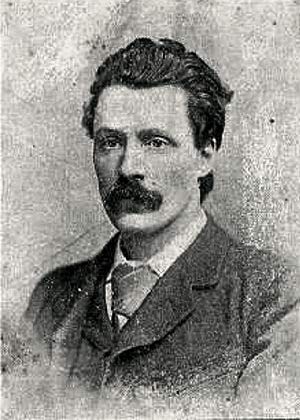
George Gissing - author
Researched and written by Dick Passmore
Return to Exeter People Menu
Many people will probably be wondering ‘who on earth is George Gissing’, for he was not born in Exeter, and is little known in the city.
Gissing was, in fact, a Yorkshire man, having been born in Wakefield in November, 1857. He was one of five children, two of whom were to become novelists. Their father, a chemist, died at an early age, but this did not seem to affect Gissing, for he studied hard to gain a place at what is now Manchester University. He proved a successful academic, winning prizes for literature, and it appeared that his future was set, and he was expected to become a novelist of some standing. However, he fell in love with a lady of ill repute, and because he was not in sufficient funds to support them both, he resorted to theft and was eventually sent down from University and given a month’s hard labour following a conviction.
In 1876 he left for America to re-start his life,
thanks to some of his friends who paid for his passage. He earned
a precarious living, often close to starvation, by writing for the
Chicago Tribune. He returned to England in 1877 and settled in London
where he married Marianne Harrison, the lady with whom he fell in love
at University. His began serious writing, but his first novel was
a complete disaster, and once again he sank to near-poverty. His wife
became an alcoholic, and they eventually parted. Somehow, Gissing
managed to give her some financial support until her eventual death in
1888.
Move to Exeter
At the beginning 1891, Gissing came to Exeter, and took accommodation at 24 Prospect Park. Away from the hustle and bustle of the Metropolis, he enjoyed taking walks in the countryside around Exeter, which gave him both pleasure and inspiration. However, after only a week or two he returned briefly to London where he met and married Edith Underwood – a lady who was mentally unstable and suffered frequent fits, often becoming violent. Gissing brought her to Exeter where he continued to write and take his walks around the area. Of all the villages and hamlets he visited, Brampford Speke was his favourite, and he claimed it was the most beautiful village he had ever encountered. However, he found working at home a problem and took the lease on a property in nearby Heavitree, where he could work without hindrance.
George and Edith Gissing had two children, but, in 1897, the couple parted company, and Edith was officially certified as mentally insane. George took the children to his home town of Wakefield, where they were looked after by his sisters. This was obviously a turning point in Gissing’s career and life. His writing became more prolific, and he was considered by his contemporaries to be a writer almost in the class of the likes of Thomas Hardy.
Gissing thoroughly enjoyed Exeter, frequently being seen at the Royal Albert Memorial Museum, the Theatre Royal, the Eastgate Coffee Tavern, various concerts and readings and, of course, at the newly-opened Barnfield Hall, home of the Exeter Literary Society. He also visited the Devon and Exeter Institution in Cathedral Close – a private members’ library and reading room still flourishing to this day.
Third marriage
In 1898 Gissing met and fell in love (again!) with a French lady who had contacted him, seeking to translate one his novels. They married quietly in Rouen, France, although Gissing had not obtained a divorce from Edith at that stage. Around that time Gissing was writing Charles Dickens; A Critical Study, published later in 1898.
Gissing’s first novel written in Exeter was Born in Exile (1892), but there followed Denzil Quarrier (also 1892) and The Odd Women (1893). However, London called once again, and the family returned to the capital towards the end of 1893. Gissing’s health was deteriorating, but ten years later, shortly before his death, he published The Private Papers of Henry Ryecroft, and this was widely accepted in literary circles as one of his best works. Although a novel, it was in fact a thinly-disguised autobiography, containing much detail of his life, particularly the years he was able to enjoy in Exeter. It also described, in a somewhat oblique manner, the poverty and grief he endured during his early days.
George Gissing died of emphysema in December 1903, aged just forty-six. He had lived a strangely mixed life of poverty and success, but is still remembered in literary circles for many of his works.
Thei article originally appeared in the Exeter Local History Society newsletter

George Gissing.
│ Top of Page │